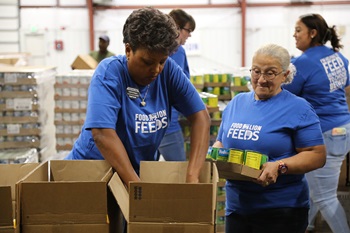<p>By: Leslie G. Sarasin, President and CEO, FMI</p><p>"It’s happening again," one of our members told me over the phone. He was referring to customers loading their carts with toilet paper, ostensibly fearing that the ports strikes on the East and Gulf Coasts would impact supply. While we have empathy for consumers during this time of uncertainty, these behaviors are not fact-based since the paper supply in this country is domestic. To me and many of our members, it feels like shoppers are returning to their pandemic playbooks and we should anticipate more of this impulse-purchase behavior as the strike persists, especially as rumors play out in private forums and on social media.</p><p>We should recognize that certain categories may experience out-of-stocks due to demand pressures on a stressed supply chain, so shoppers might need to be flexible if they are unable to purchase their favorite product or flavor. Still, there will be food and a comparable product. </p><p>As a Kentuckian and the CEO of a trade group of essential workers that kept America fed and safe during a global pandemic, I can say with confidence that this is not my first rodeo; the supply chain continues to adapt under the circumstances, and retailers work closely with their supplier partners to develop contingency plans to mitigate and respond to the potential for out-of-stocks. </p><img src="https://www.fmi.org/images/default-source/blog-images/food-lion-food-assistance.tmb-large-350-.jpg?Culture=en&sfvrsn=57dae0f6_2" style="float:right;margin-top:10px;margin-bottom:10px;margin-left:20px;" class="-align-right" alt="mg-caption:Food Lion associates support communities in need." sf-size="100" /><p>Unfortunately, compounding this strike scenario, Americans and businesses across six states are also trying to cope with the destruction of Hurricane Helene, and we are staring down a humanitarian crisis of extraordinary proportions. Many of our members had thriving businesses in these areas, employing the very community that now suffers unfathomable losses. I have faith in the fact that whether it is a national disaster or a supply chain disruption such as the port strike, the food industry does what it does best – care for customers and communities at a time when they need it the most. </p><p>This is why I was particularly disturbed to read a piece last week by personal finance reporter Daniel de Visé claiming, "<a href="https://www.usatoday.com/story/money/2024/09/25/americans-upset-grocery-store-industry/75347520007/" target="_blank">Americans are mad at grocery stores</a>." While the recent inflationary period has understandably put a strain on shoppers, I fundamentally object to the premise of his article. The poll that Mr. Visé cites shows shopper dissatisfaction extends beyond the grocery industry to the entire business community because inflation has broadly impacted gasoline, shelter, food, and goods and services. The complexities of food price inflation can be difficult to fully capture considering myriad economic data and trends, but according to the <a href="https://www.fmi.org/our-research/research-reports/u-s-grocery-shopper-trends">U.S. Grocery Shopper Sentiment Index</a>, the overall grocery shopping experience remains resilient and positive. Still, we recognize that an extended strike will likely cause increases in the cost and availability of goods, intensifying this inflationary environment.</p><p>Shoppers should continue to trust that their store is on their side. Our industry is competitive by nature, with <a href="https://www.fmi.org/our-research/research-reports/food-retailing-industry-speaks">1.6% net profit margins</a> on average, but when times get tough — especially in the case of disaster — we deliver food, water, and necessary supplies. We come together regardless of competition to ensure we keep the nation fed, as evidenced by our unflappable work during a global COVID-19 pandemic and the recent devastation by Hurricane Helene. </p><p>I am honored to work in the food industry, which continues to rise to the occasion and meet the challenges of our times.</p><p><a href="https://www.fmi.org/industry-topics/crisis-management/hurricane-helene-resources" class="button">FMI’s website on hurricane recovery</a></p>
[#item_full_content]



